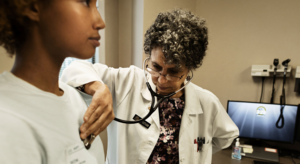
Last month I was in Chicago at the SEAK Non-Clinical Careers Conference. This is one of my favorite conferences and I love volunteering there as a mentor every year. I sat in a humongous room in the Crown Plaza Hotel at a tiny table where I met with a different physician attendee every 15 minutes for 2 days.
In mini-mentoring sessions that felt like a cross between the old game show, “Beat the Clock “ and a live version of, “What Color is My Parachute?” I talked with doctors about their particular career situations.
There were close to 400 physicians at the conference, some coming from as far away as Saudia Arabia and the Caymen Islands. There were diverse specialists, from pathologists to surgeons, and many primary care physicians. I met with a medical student, a resident, a septuagenarian, and many docs in their 30’s – 50’s.
Does everyone want to leave medicine? No, not at all. Many still like caring for patients, but need something to change. At issue are the common problems affecting doctors nationwide – burnout, lack of control, frustration with the EMR, long hours, little time for family or self, and feeling stagnant. Then there are the positive drivers – the desire to make a difference in a bigger way, entrepreneurial ideas, an interest in focusing on wellness, not illness, and just plain curiosity.
When they weren’t meeting with mentors or recruiters, the attendees listened to speakers who had transitioned into areas such as:
- Pharma and medical devices
- Consulting
- Informatics
- Insurance (life, disability, and health)
- Non-profit sector
- Government
- Administration
- Entrepreneurial endeavors
- Medical writing
- Financial planning
Whenever I’m at SEAK and meeting with doctors, there are always some tears shed, some giddy laughter, and a lot of getting to the heart of the matter. With such a short time to talk (15 min), I want to know what is really important to this individual sitting in front of me, and start sketching out a path of possibility.
I always end up with these thoughts every year after this conference:
Doctors are pretty amazing people. They are incredibly hard working, persistent, responsible and care deeply about making a difference in the world. It saddens me to see so many feeling trapped. But I also have faith in their ability to find what is right for them. This is truly a challenging time for healthcare, and challenging times bring out innovation and can be a catalyst for positive change.
In the “good old days,” few doctors knew about non-clinical careers and no one talked about having a portfolio career. Perhaps a silver lining to these troubled times is that doctors are gaining a broader perspective on career possibilities and can plan, even from medical school, for a more diverse and sustainable professional path. Fulltime clinical practice until retirement has been the norm, where the doctor “dies with his boots on.” However, just as stock portfolios benefit from diversity, so too can a doctor’s career be strengthened by combining patient care with non-clinical pursuits, or having different career stages that allow for continued growth, learning and engagement.
Since I first attended SEAK in 2010, the number of attendees has grown over 40%. The popularity of this conference is evidence that the traditional practice of medicine is not satisfying to many physicians. Let us not judge doctors for looking into options, but try to understand what is at the root of the searching and look for win-win solutions.
Disclaimer: I have no financial association with SEAK.
Latest Posts
Find what you're looking for:
Popular Categories:
Career Change | Career Enhancement | Job Search | Personal Development
2 Comments
Leave a Comment























Dear Ms Fork,
It was wonderful reading about the availability of non-clinical careers for doctors who feel trapped in their current role. Let me explain my situation…I am a clinical microbiologist, working as a consultant at a private lab. I am unhappy with my current role because I have a lot of free time which I am unable to utilize..I don’t get to interact with other physicians much, so there is limited growth..Attending a conference means missing three days of work (and pay). And, above all, I am not being paid much.
The positives…I am responsible for the day-to-day fuctioning of the “Microbiology dept.” of the lab. I take the final technical decisions. This requires that I read continually so that I am academically abreast.
But again, I feel I should be better paid and get more exposure through interaction with other microbiologists and clinicians.
I also like documenting rare/important findings in medical journals. I write well and enjoy writing. I have a sound knowledge of most medical specialities. I don’t want to transition into being a medical writer, but…
What have you for me?
Regards and Thanks,
Dr Parul Salunke.
Thank you very much for reading and your positive remarks. I appreciate the challenges you are experiencing in your current position as a consultant in a private lab. I have sent you an email to further discuss.